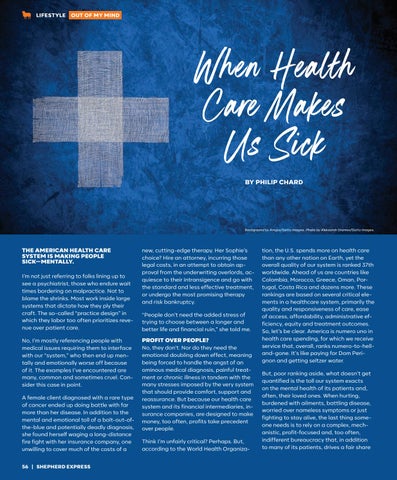LIFESTYLE OUT OF MY MIND
When Healłh Care Makes Us Sick BY PHILIP CHARD
Background by Amguy/Getty Images. Photo by Aleksandr Gromov/Getty Images.
THE AMERICAN HEALTH CARE SYSTEM IS MAKING PEOPLE SICK—MENTALLY. I’m not just referring to folks lining up to see a psychiatrist, those who endure wait times bordering on malpractice. Not to blame the shrinks. Most work inside large systems that dictate how they ply their craft. The so-called “practice design” in which they labor too often prioritizes revenue over patient care. No, I’m mostly referencing people with medical issues requiring them to interface with our “system,” who then end up mentally and emotionally worse off because of it. The examples I’ve encountered are many, common and sometimes cruel. Consider this case in point. A female client diagnosed with a rare type of cancer ended up doing battle with far more than her disease. In addition to the mental and emotional toll of a bolt-out-ofthe-blue and potentially deadly diagnosis, she found herself waging a long-distance fire fight with her insurance company, one unwilling to cover much of the costs of a 56 | SHEPHERD EXPRESS
new, cutting-edge therapy. Her Sophie’s choice? Hire an attorney, incurring those legal costs, in an attempt to obtain approval from the underwriting overlords, acquiesce to their intransigence and go with the standard and less effective treatment, or undergo the most promising therapy and risk bankruptcy. “People don’t need the added stress of trying to choose between a longer and better life and financial ruin,” she told me.
PROFIT OVER PEOPLE? No, they don’t. Nor do they need the emotional doubling down effect, meaning being forced to handle the angst of an ominous medical diagnosis, painful treatment or chronic illness in tandem with the many stresses imposed by the very system that should provide comfort, support and reassurance. But because our health care system and its financial intermediaries, insurance companies, are designed to make money, too often, profits take precedent over people. Think I’m unfairly critical? Perhaps. But, according to the World Health Organiza-
tion, the U.S. spends more on health care than any other nation on Earth, yet the overall quality of our system is ranked 37th worldwide. Ahead of us are countries like Colombia, Morocco, Greece, Oman, Portugal, Costa Rica and dozens more. These rankings are based on several critical elements in a healthcare system, primarily the quality and responsiveness of care, ease of access, affordability, administrative efficiency, equity and treatment outcomes. So, let’s be clear. America is numero uno in health care spending, for which we receive service that, overall, ranks numero-to-helland-gone. It’s like paying for Dom Perignon and getting seltzer water. But, poor ranking aside, what doesn’t get quantified is the toll our system exacts on the mental health of its patients and, often, their loved ones. When hurting, burdened with ailments, battling disease, worried over nameless symptoms or just fighting to stay alive, the last thing someone needs is to rely on a complex, mechanistic, profit-focused and, too often, indifferent bureaucracy that, in addition to many of its patients, drives a fair share
















